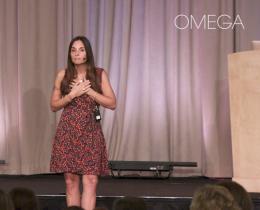Omega: How is The Work, or the process of inquiry, different from doubting or second-guessing?
Katie: As different as day from night. Doubting or second-guessing comes from a lack of self-confidence and leads to confusion, which is only suffering. Inquiry leads to the end of suffering. It always leaves you as a kinder human being.
Omega: How does questioning our thoughts (using a process like The Work) help us to live in peace?
Katie: Believing our stressful thoughts is the cause of all our suffering. When we question those thoughts, the thoughts begin to unravel. They lose their power over us, and we can begin to see the world clearly, as it really is, rather than through the filter of our thoughts. Suffering is optional. We don’t suffer because of what happens to us; we suffer because of our thoughts about what happens to us.
Omega: Is the goal of inquiry to get answers or to let go of your thoughts? Are you looking to find some deeper knowledge?
Katie: You can’t let go of a stressful thought, because you didn’t create it in the first place. A thought just appears. You’re not doing it. You can’t let go of what you have no control over.
Once you’ve questioned the thought, you don’t let go of it, it lets go of you. It no longer means what you thought it meant. The world changes, because the mind that projected it has changed. Your whole life changes, and you don’t even care, because you realize that you already have everything you need.
Actually, inquiry has no goal. If you do The Work with any kind of motive, even the best of motives—getting your husband back or healing your body or saving the world—it won’t be genuine, because you’ll be looking for a certain kind of answer, and you won’t allow the deeper answers to surface.
Only when you don’t know what you’re looking for can you be open to the answers that will change your life. Any motive other than the love of truth won’t work. It’s the truth that sets you free. That’s an accurate statement—it’s not just written in a bible somewhere. And the truth we’re talking about is not someone else’s truth; it’s your own. That’s the only truth that can set you free.
Omega: What is the biggest challenge in talking about something that is beyond words? How do you help people understand their true nature?
Katie: I don’t talk about what is beyond words. I point people to it. All I have to offer is the four questions and turnarounds. I offer them so that you can disassemble your own identity.
As people answer the questions, they begin to disassemble everything about who they think they are, everything frightening about their existence as they believe it to be, and in the process, as they disassemble the nightmare, they begin to notice that even the dream of what is beautiful isn’t true.
Eventually there’s nothing left but our own nature: brilliant, infinite, free.
Omega: As one starts to see beyond the “I,” how does one continue to be a parent, friend, partner, employee, etc. as the stories of those identities crumble?
Katie: As these identities crumble, you become clearer and kinder. Decisions make themselves, effortlessly. Life becomes transparent.
Omega: You talk about the importance of stillness and contemplation in inquiry. What do you mean by this? Is this different from meditation?
Katie: You need to get really still in order to answer the questions. But stillness is just a beginning.
If you learn to meditate, the mind becomes quiet, and you can become very calm. It’s easy to be “spiritual” when things are going your way. But then it can happen that you get a parking ticket—and wham!—you’re upset.
When thoughts are simply observed and not investigated, they retain the power to cause stress. You either believe your thoughts or you don’t; there’s no other choice. They’re like someone whispering to you; if you aren’t really listening, you don’t react. But if you hear that person loud and clear, you can’t disregard what he’s saying and you may react to it.
With inquiry, we don’t just notice our thoughts, we see that they don’t match reality, we realize exactly what their effects are, we get a glimpse of what we would be if we didn’t believe them, and we experience their opposites as being at least equally valid.
An open mind is the beginning of freedom.



